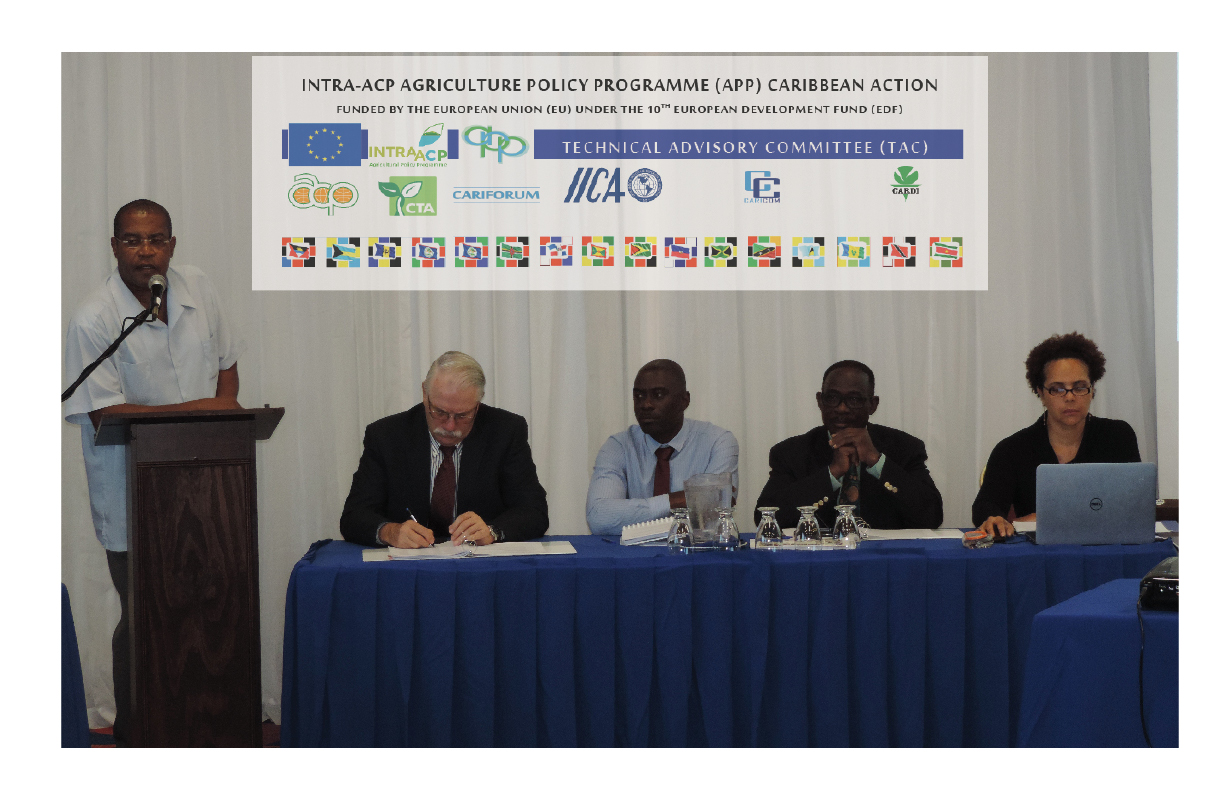
News Date: September 07 2016
Port of Spain, Trinidad & Tobago, September 2016 – Discussing the proceedings of a Technical Advisory Committee (TAC) for an agriculture project in the Caribbean probably sounds like a dry subject. It conjures up images of bureaucrats sitting around a table discussing policy and plans, hashing out process and determining progress. Frankly, that pretty much sums up the TAC for the Agricultural Policy Programme (APP) which took place in Port of Spain, Trinidad and Tobago on 11 and 12 August, 2016. However, if one considers the history of agriculture development projects in the Caribbean, this particular picture becomes quite exciting. It is not that the meetings and topics were unusual, but rather the mix of company.
The Caribbean has a long history of agriculture development projects. From the Regional Food and Nutrition Strategy in the 80s, to the Regional Transformation Programme in the 90s and the Jagdeo Initiative in the early 2000s, many attempts have been made to strengthen this industry which holds great potential for the Caribbean. However, it has been difficult to get the most out of these initiatives without the involvement of every CARIFORUM country and representation from all interested parties in the Caribbean, from farmers and researchers, to private sector service providers, development agencies and governments.
The Caribbean action under the APP, which aims to reduce poverty and increase food and nutrition security in the Region through the support of smallholder agriculture, wanted to directly tackle this historical problem by bringing both countries and all interested agencies together.
“Despite some problems and hiccups, I am proud to say that the Caribbean has collaborated well in this effort. It is not normal,” said Jethro Greene, the Chief Coordinator for the Caribbean Farmers Network (CAFAN) in his closing comments at the TAC. “A few people had a vision for not just their own country. The only future we have is joint action. It is impossible for any country to think they can lead their own charge in agriculture and make it. We must work together.”
Mr. Greene’s comments were echoed by many others during the TAC proceedings including Dr. Inez Demon of the Centre for Agriculture Research in Suriname (CELOS). “This is a great sign of how far we have come,” she said. “I have struggled in getting CELOS to the table where there is usually only government officials. We are very, very grateful that we were able to play our part in the APP programme.”
Thirty-five participants from around the Caribbean were in attendance at the two-day meeting. Development agencies participating in the discussions included the CARICOM Secretariat (CCS), CARIFORUM, the Caribbean Agricultural Research and Development Institute (CARDI), Caribbean Exports, the Food and Agriculture Organization (FAO), the Organization of Easter Caribbean States (OECS), the Inter-American Institute for Co-operation on Agriculture (IICA), and the Technical Centre for Agricultural and Rural Cooperation (CTA). Research institutions were represented by the College of Arts Science and Technology, Jamaica (CAST), CELOS, the Dominican Institute of Agricultural and Forestry Research (IDIAF) and the Faculties of Food and Agriculture, and Engineering from the University of West Indies (UWI).
The interests of small producers and enterprises were directly represented by organizations such as CAFAN, the Caribbean Agribusiness Association (CABA), the Caribbean Agricultural Forum of Youth (CAFY) and the Caribbean Network of Rural Women Producers (CANROP). Rounding out the attendees list were service providers whose presence in the value chain is irreplaceable, such as financiers, with representation from the Agricultural Development Bank of Triniad and Tobago.
Admittedly, the APP project hasn’t been without its challenges. When the project was signed in March 2013, the lead implementing partners and their collaborating agencies needed to establish trust and mutually beneficial relationships. Also, though direct beneficiary input was planned into the project it wasn’t necessarily factored into the project planning. While the need to engage beneficiaries in project design was well appreciated by the APP Implementing Partners, the choice then, was to either get a project approved within the final weeks of 2010 or miss the opportunity entirely for having an APP.
On reflection, Vassel Stewart, president of CABA affirmed that “we should have involved the stakeholders in the planning stage. It may have given the project a different start. We could have had greater clarity, linking the objectives with specific projects.” Notwithstanding this, he readiliy ackowledged that the project is showing great benefits. “The support we are getting is the most that my members have ever received”, he said. “It places us in a position that we can sustain ourselves”.
Collaboration has historically been difficult in the Caribbean and it took time to forge these relationships and launch brand new ties. These challenges almost brought the project to a halt in early 2015. However, project partners and key stakeholders rallied together to create a scaled-down work plan version of the APP (SDWP). Importantly, direct beneficiaries, such as “CAFAN and CABA informed the SDWP and that made it work,” said Gregg Rawlins, the Representative in Trinidad & Tobago and Co-ordinator, Regional Integration Caribbean Region, IICA. “It is a shift from traditional approach. Here agencies have a more direct engagement with the beneficiaries themselves. It is about keeping our eyes on those we are seeking to support and help. Let’s hope this sets the framework for future regional programmes.”
Since then, work has been moving forward at a rapid speed and with good success. Juan Cheaz of the CTA agrees. “We have been able to gain a good pace and move on priorities in the Region by connecting agencies,” he said in his comments to the TAC.
Diana Francis, the IICA Officer-in-Charge for the APP Project Management Unit, is hopeful about these new and strengthened relationships. She sees the potential to take this model even further. “We need to find out who can help us outside of traditional agriculture circles,” she says. “We need to open up the pool of who we bring into the discussions.”
A good example of this is how the UWI Engineering Department became involved in the project. Ruel Ellis a Lecturer and Engineer in the UWI Faculty of Engineering , was asked to provide some casual feedback on project planning documents as part of the preparatory process for the SDWP. While reading about some of the project initiatives, his engineering mind came alive with ideas. The PMU invited him to put his suggestions forward.
Today, Dr. Ellis and his team have become an important part of the project, working on a protected agriculture initiative which uses environmentally friendly options for cooling greenhouses to an appropriate temperature. Dr. Ellis’ passion for and commitment to the project is palatable. “It was quite by accident that this relationship began,” he said, “but now that it is started I hope that it continues.”
As far as institutional collaboration goes, Dr. Ellis shared the experiences of this new engagement with the APP and what it took to get a formal agreement to work together on one activity under the CARDI-led component. He summed up this experience with an observation that there is a ‘‘painful history that prevents collaboration. If we can find out what the historical pain is and address it, we can bring everyone to the table and make progress for agriculture in the Caribbean.”
Indeed, there is still work to be done before the project comes to an end, and even though all involved acknowledged its rough start, those who have been engaged with the project are pleased with how much has been achieved under the SDWP version.
Added to the tangible contributions made to the beneficiaries, at the closing of the TAC, there was an overall consensus that an attitude of collaboration may just be the greatest achievement of the APP to date. All agreed that the relationships that have been started must continue even when the project comes to an end. There is even a new sense of collective responsibility among an expanding stakeholder base, as well an expectation among the stakeholders, that given what was accomplished in such a short space of time through the scaled down plan, favourable consideration should be given to continuing the project.
“We have fostered strong relationships with stakeholders,” said Gregg Rawlins in his closing statements. “We have had direct engagement with them and recognize that they all have an important contribution to make. We want to ensure that they have a voice in the way forward.”

News Source: Agriculture Policy Programme (APP) Caribbean Action

